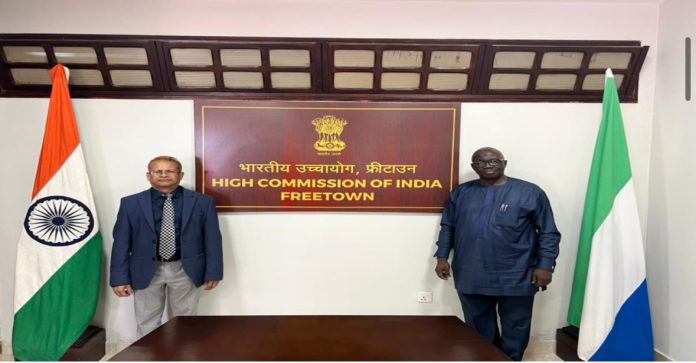AYV News, July 4, 2025

The National Disaster Management Agency (NDMA) today engaged the Indian High Commissioner to Sierra Leone, H.E. B. C. Pradhan, in a strategic meeting focused on the development and deployment of a state-of-the-art Early Warning System (EWS) for the agency.
The meeting, held at the Indian High Commission on 32B Wilkinson Road, Freetown, follows a formal proposal submitted by the Indian Commission two weeks ago, indicating the Indian Government’s intent to support the NDMA with technical expertise and institutional capacity-building aimed at enhancing NDMA’s disaster risk management and Early Warning Systems.
Welcoming the NDMA delegation, Commissioner Pradhan applauded the agency’s leadership in generally managing disasters in Sierra Leone. He went further to state that: “Coming from a disaster-prone country like India, I know firsthand how critical a robust early warning system can be in saving lives and property. The Government of India is committed to supporting Sierra Leone with a model system that could serve as a benchmark in the sub-region.”
In his response, NDMA Director General, Lt. Gen. (Rtd) Brima Sesay, expressed deep appreciation for India’s willingness to support the agency’s ongoing efforts to improve on its operations. He outlined the agency’s achievements, including the establishment of regional, district, and chiefdom disaster management committees and regional offices in Bo, Kenema, Port Loko, Makeni, and Freetown.
The DG further noted that the agency has responded to over 50,000 victims of various disasters and has undertaken a lot of risk reductions activities since the agency was established in 2020.
“This initiative comes at a time when the Agency is facing several challenges, including limited early warning infrastructure, storage facility constraints, shortage of relief items, and inadequate operational vehicles,” the DG stated. “We are deeply grateful for India’s support, which aligns with our capacity-building priorities.”
Commissioner Pradhan further disclosed that the Indian Government has already engaged a specialized company to implement the EWS project. The next steps include the selection of key government institutions to support the implementation of the project, a virtual coordination meeting with the Indian service provider at a later date, the signing of an MoU between both countries, the full project implementation, and capacity-building phase to train NDMA staff in both Sierra Leone and India.
The project is expected to last between seven to fifteen months after the signing of the MoU.

